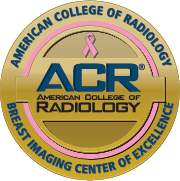
Santa Barbara Women’s Imaging Center is now a Breast Imaging Center of Excellence as designated by the American College of Radiology (ACR).
This designation means Santa Barbara Women’s Imaging Center has achieved accreditation by the ACR in stereotactic breast biopsy, breast ultrasound, and ultrasound-guided breast biopsy, breast MRI and in mammography, and signifies that we provide these essential services to our community at the highest standards of the radiology profession.
Breast Implant Surveillance MRI
Breast augmentation is the most popular cosmetic surgical procedure in the USA. Although there have been many improvements made to silicone implants over the years, implant rupture is a common occurrence with up to 1 in 7 breast rupturing within the first 10 years. When the implant lining tears, leaked silicone can cause pain, swelling and changes in breast shape. Yet most ruptures are “silent” displaying no symptoms at all and increasing the likelihood of scar tissue. Breast MRI is the most sensitive and specific way to detect a silent rupture. The Food and Drug Administration (FDA) recommends that women with silicone implants check their implants with non-contrast MRI starting 3 years after initial implant surgery and every 2 years thereafter. If your implant has failed, your plastic surgeon can provide you with options and assist you in making a claim on the warranty. The major FDA-approved breast implant manufacturers (Mentor, Allergan) offer a 10-year warranty on their implants.
Santa Barbara Women’s Imaging is a premier provider of breast imaging services Our fellowship-trained radiologists have the longest experience with Tomosynthesis 3D mammography, whole breast ultrasound and MRI in the central coast region. Call us today at (805) 560-8111 to schedule an appointment. Ask how we can save you time by scheduling your annual Tomosynthesis mammogram alongside your breast implant surveillance MRI scan!
Implant MRIs are designed to look at implant integrity only and are performed without IV contrast. Breast MRIs used to detect cancer, are performed with Gadolinium contrast delivered through an i.v.(intravenous catheter). Implant MRIs, therefore, do not detect cancer and do not replace the need for screening Tomosynthesis or screening breast MRI which is usually recommended for women with a high risk of breast cancer.
In all women, the American College of Radiologists, Surgeons, OB-GYN and many other societies recommend annual screening mammography after the age of 40. To learn more about Tomosynthesis screening 3D mammography click here. In women with dense breast tissue, automated whole breast ultrasound is an added benefit.
In women with silicone breast implants, the FDA recommends that you check your implants through MRI scans starting 3 years after initial implant surgery, and every 2 years thereafter. If your implant has failed, your physician can provide you with options and assist you in making a claim on the warranty.
In women with high risk of breast cancer and breast implants, a breast MRI with contrast is recommended in addition to Tomosynthesis. To determine if you are at an elevated risk of breast cancer, risk assessment can be performed. If you have silicone implants, an additional scan can be performed at the time of your contrast MRI to determine if your implants are intact.

